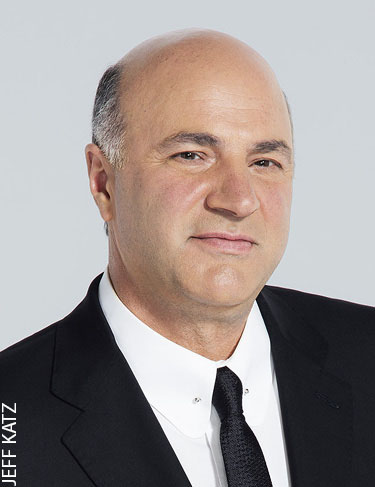
Investor: Kevin O’Leary
Shark Tank Appearance: March 11, 2016
Deal: $100,000 for a 25 percent stake
Results: Total sales increased from $100,000 to $14 million
“Pee responsibly” may not be words you’d expect to hear from the urbane Kevin O’Leary. Especially not coming from a projection of his image peering out from the inside of a toilet bowl.
So it’s a testament to how deeply the Shark Tank star believes in Matt Alexander and Mike Kannely, creators of IllumiBowl, a motion-activated toilet bowl light. O’Leary took the plunge into the porcelain throne and appeared in a video for their latest Kickstarter campaign, which ran about six months after the trio made a deal on the long-running ABC business reality show.
“One of the most important parts about running a successful business as an entrepreneur is being all in,” O’Leary says. “It’s a full-time job, especially when you’re starting out. Matt and Mike understand this and have committed every fiber of their being, and almost every minute of their time, to making IllumiBowl a success.”
Alexander shared some of the most important lessons he and Kannely have learned since they began helping people do their middle-of-the-night business “in a whole new light.”
Related: 9 Lessons Successful Entrepreneurs Wish They Heard Sooner
Relationships are everything.
Once the Shark Tank deal was in place, Alexander and Kannely signed an exclusive distribution contract with Bed Bath & Beyond. Then they went to work on an improved IllumiBowl with customized dimming, a stronger motion sensor and more color options, and reached agreements with Wal-Mart and other vendors to carry that version. “We were in way over our heads,” Alexander says. “We didn’t realize how many protocols we were violating by making those other deals when we had exclusivity with Bed Bath & Beyond and that it could have voided our contract with them.”
Luckily, O’Leary stepped in to fix the issue. He made it possible for Alexander and Kannely to continue to make deals with other stores while maintaining their agreement with Bed Bath & Beyond, by giving the store “first dibs” on new products. “We’ve learned not to be so hasty in making decisions and that maintaining strong relationships with buyers is absolutely essential.”
Crowdfunding is about more than raising money.
IllumiBowl began with a Kickstarter campaign in October 2014 and a goal of raising $20,000. In 40 days pledges totaling nearly $100,000 poured in. “When we ran that first campaign we were totally broke,” Alexander says. “I was still in college and Mike was working at Wal-Mart, so crowdfunding was our only way of making things happen. As it turned out, the overwhelmingly positive response provided not just money but also an important validation of our idea and a group of people who were excited about the product. So, when we upgraded IllumiBowl we took it back home to those early adopters.” That second Kickstarter campaign raised more than $225,000 from nearly 8,000 backers.
Recognize the difference between what’s important and what’s urgent.
Text messages create a sense of urgency, but if you respond to every one immediately, is that really going to contribute to your success? Is getting your inbox to zero going to move your business forward more than spending time crafting careful responses to three critical emails? “The book The 80/20 Principle [by Richard Koch] says that 80 percent of business results from 20 percent of effort, really helped me learn to spend my time and energy in the most effective way,” Alexander says.
Don’t wait to dot every “i” and cross every “t.”
When you’re dealing with product development, it’s important to move quickly. In a competitive marketplace, you don’t have time to wait to get a patent approved—the backlog in the U.S. Patent and Trademark Office can take three years or longer, Alexander says. But you can get things started pretty much immediately with a $130 provisional patent application, which provides “patent pending status.” Then, forget about devoting months to polishing your business plan; it will shatter when it hits reality. “What you want to do is produce a batch of product—even if it’s not pretty or perfect—that’s good enough to get in front of people who can help you identify problems and suggest ways to make it better,” Alexander says. He believes it’s better to do that with your crowdfunding base as a focus group than by bringing the product to Wal-Mart. Just be sure that, once you have the kinks worked out of the product, you share it with everyone who pledged their early support.
Related: 5 Lessons I Learned From 200+ Successful Entrepreneurs
This article originally appeared in the June 2017 issue of SUCCESS magazine.








